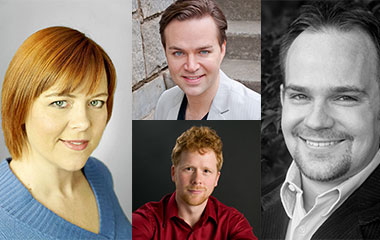PREMIERES IN MONTANA WITH 2 ORCHESTRAS, 3 CHORUSES, AND 6 ACCLAIMED SOLOISTS

On Saturday, March 28 at 7:00 p.m. (note the 7:30 p.m. usual time) in the Helena Civic Center, the Helena Symphony presents the Montana premiere of J.S. Bach’s St. Matthew Passion. Additionally, the work will be “ritualized,” meaning it will be a semi-stage performance with choreographed-like moments that capture the poetry and narrative of the final days of Christ’s life. This is an unprecedented performance as only one other orchestra in the world has performed the work “ritualized.” Bach considered the St. Matthew Passion his greatest work of the more than 3,000 works he composed. He composed it for two orchestras, two adult choruses, a children’s chorus, six main soloists, and eleven other smaller solo roles. In addition to the Helena Symphony Orchestra & Chorale and the Helena Youth Choir, six nationally acclaimed soloists will perform this Passion. For Christians, the performance conveniently is on the evening before Palm Sunday – the day that Holy Week begins.
“This is simply a masterpiece,” says Music Director Allan R. Scott. “Not only is the St. Matthew Passion Bach’s crowning achievement, it is one of the greatest monuments of humankind. While it was composed nearly three centuries ago, it is still very much a work of our time. The St. Matthew Passion transcends religious beliefs or spirituality, as it is an epic journey that evokes the grief, hope, love, and suffering of the human spirit.”

Nationally-noted choreographer and stage director Heather Adams brings the “ritualization” element to the project. “The staging is not the traditional narrative type staging that we see in theatre, as it is not meant to reenact the story,” Ms. Adams explains. “It is the most famous story of all time. The staging is there to give visuals that suggest the reaction to the story as well as to allow the audience into the feelings of grief, struggle, forgiveness, and hope. This will not resemble a concert in many ways – there is not the traditional concert dress, and or any formal entrance of soloists and conductor. It is meant to be a non-sacred ritual that evokes a reaction today in our time.”
Christians have been observing the telling of the Passion since the fourth century, and musical settings of the story began at the end of the twelfth century. Setting the final days of the life of Jesus Christ to music from the text of the four Gospels, passions were traditionally grand works complete with the biblical narration along with newly composed poetic texts using recitatives (quasi-spoken moments to advance the plot of a story), familiar chorales for the congregation to sing, arias of almost operatic splendor, and opening and closing choruses.
The Passion according to the Gospel of St. Matthew was traditionally performed with the Roman Catholic Mass on Palm Sunday (the beginning of Holy Week leading up to Easter). By the time Bach composed his two Passions (St. John, then St. Matthew), the story was well incorporated into the Lutheran service. Using every word of Chapters 26 and 27 in the Gospel of St. Matthew, Bach also interspersed a second layer of text that were more reflective passages written by Bach’s friend and poet Christian Friedrich Henrici (1700-1764), who used the pen name “Picander.”
The narrative part of the St. Matthew Passion is told by the Evangelist, the tenor solo who speaks for St. Matthew. While the Evangelist often merely gives testimony, there are beautiful moments where he seems to become overwhelmed and touched by the powerful story. The role of the Evangelist, the main role in the work, will be performed by internationally-acclaimed Tenor Ross Hauck, who is considered one of the leading early music tenors in the United States today. Baritone Evan Thomas Jones performs the role of Jesus, and is joined by four other soloists from throughout the country, including: Soprano Rachel Copeland, Mezzo Soprano Kimberly Gratland James, Tenor Wesley Morgan, and Bass Paul Houghtaling.
This is a rare opportunity to see Bach’s greatest and favorite work. “We at first are a witness to the ‘passion’ (which literally means, ‘to suffer’) of a man, be it Christ or anyone,” explains Maestro Scott. “The immense journey culminates with a reflection as ‘we sit in tears’ (the final words of the piece); and while the grief is overwhelming, we are also left with courage, acceptance, and hope, and all because we have moved from ‘passion’ to ‘com-passion’ – meaning ‘suffer with’ one another.”
Tickets are available on line 24 hours a day at helenasymphony.org, or by calling the Symphony Box Office (406.442.1860), or at the Symphony Box Office located on the Walking Mall at the Livestock Building (2 N. Last Chance Gulch, Suite 1) between 10 a.m. and 4 p.m. Tickets range from $52 to $12.
Please contact the Helena Symphony for interviews with Music Director Allan R. Scott, tage Director Heather Adams, and /or any other soloist.

